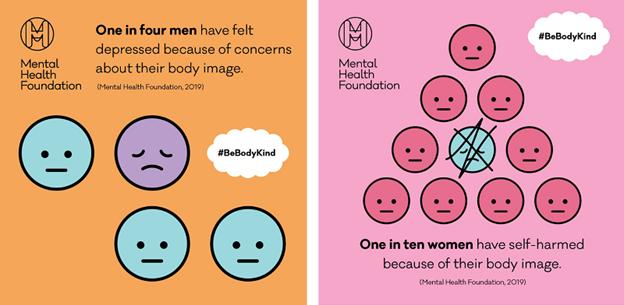
3 minute read
Mental health and body image (Chloe You
THE ISSUE
As humans, we are all learning to live with the fascinations and limitations of our bodies as they change through life, and no piece of technology that we will ever buy will match the intricacy, elegance and regenerative powers of our bodies. Yet, for multitudes of people all over the world, our bodies are sources of humiliation and distress. Having body image issues and concerns is a relatively typical experience for all and is not a mental health issue in itself. Nonetheless, it can be a risk factor for mental health problems Research has found that higher body dissatisfaction is associated with a lower quality of life and psychological distress higher risk of depression or depressive symptoms and higher risk of unhealthy eating behaviors. On the other hand, body satisfaction has been linked to a better overall sense
Advertisement
. WHO DOES IT AFFECT?
Everyone can be affected by body image issues that lead to mental health concerns, but there are those who have higher risks such as children, teenagers, people who have a history of mental illness, women, Asian Americans and LGBTQ community. In today’s society, teenagers and children have earlier and easy access to social media. There have been public health campaigns to help encourage positive body image but more work needs to be done. As the body image dissatisfaction stats increases, there should be advertising and social media regulations, especially as more and more children engage in them earlier in their lifetime.
GLOBAL IMPLICATIONS
There are many different sides to body image issues however the tools that are utilized to compute body image in research are often focused on body weight and/or shape which can be restricted when trying to interpret body image and ethnicity as people from different cultural and ethnic backgrounds have different body ideals. According to research, differences between people with different ethnic backgrounds in levels of body dissatisfaction are minute which means that ethnicity may have less of an influence on body image than other determinants like weight, gender or age. However, in general, Black British males and females are more satisfied with their bodies than Caucasians, and Asian Americans (adults and adolescents) tend to have lower body satisfaction than White Americans. It also has been found that the primary factor that leads to mental health issues from body image dissatisfaction is media where many women and men are vulnerable to discriminations as well as comparison amongst influencers. This was found to be associated with mental health issues such as depression and anxiety. Not only that, in the United States, body image immigrant communities may be vulnerable to stress from adapting to a new culture. There are not enough research done about body image dissatisfaction in developing countries such as Africa.
STATISTICS
Mental Health Foundation has found that 47% of 18-24 yo, 36% of all women, almost 20% of 55+ yo people stressed over their body image to the extent of being overwhelmed. In a survey performed by Mental Health Foundation, over ⅓ of adults said they felt anxious or depressed because of their body image and ⅛ experienced suicidal thoughts and feelings because of concerns about their body image.
DETAIL >
2019. https://www.mentalhealth.org.uk/publications/body-image-report. Accessed March 28, 2021.
MY OPINION
I definitely agree with all of the resources that I’ve collected. I think the media has the most impact, especially in today’s society where almost everyone and anyone has access to them. Mental health issues from these body image dissatisfaction is not something that we can ignore because like I mentioned everyone can be exposed to them and are at risk. It can lead to serious mental disorders such as BDD, depression, anxiety and social anxiety which can in turn lead to suicidal thinking and ideations







